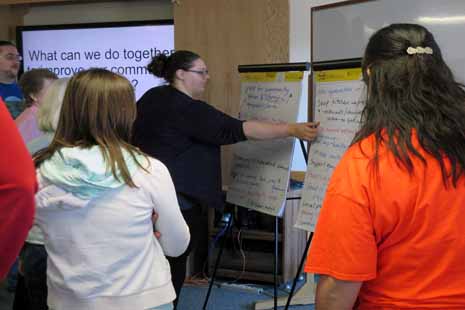Oregon Rural Action (ORA) recently partnered with the Oregon Food Bank and Oregon State University Extension Service to host two community FEAST events that brought people together to work on improving the local and regional food systems. Through these events, ORA members were able to engage with others in the community to uncover issues most important to people and address those issues.
FEAST (Food, Education, Agriculture Solutions Together) is a formatted organizing tool developed by the Oregon Food Bank. It uses a day-long program to think through what the local food system is, envision what an ideal local food system might look like, and reflect upon challenges and opportunities to making improvements. The educational event included a shared meal and grouped people by interest area into working groups.
For a FEAST event to be most successful, a diverse group of participants from all stages of the food system—ranging from producers, marketers, distributers, and consumers—needed to be included. To achieve this, FEAST planning committees, which included ORA Food and Ag Policy Team members and ORA staff, worked closely with an AmeriCorp Resource Assistance for Rural Environments (RARE) volunteer, who is conducting a food systems assessment for Union and Baker counties in Oregon. The committees planned the details of the events, promoted them and worked to make sure all groups were represented.
As part of this, the Union County Feast planning committee identified people to participate in a panel to provide a local picture of the county’s food system. The panel, comprised of local individuals, included a food bank manager, the 4-H Outreach coordinator, the Farm to School Coordinator, a certified organic farmer—Susan Boyd, also an ORA member, and the chair of the ORA board, Cori Brewster.
Boyd described the life and work of an organic farmer in the valley and the challenges of getting the message out that it was important and financially worthwhile. Brewster explained why ORA did the work we do and what she saw as opportunities for greater community engagement.
The formats of the two FEAST events were slightly different but both brainstormed the community resources that existed in the counties and captured elements of what the perfect food system would have. Looking at the two side by side, participants then evaluated where they felt their community was doing a good job of working towards their idealized local food system and where they felt improvements could be made.
Each participant was then tasked with coming up with one solution or idea—8 to 10 words max— that they wrote on large note cards and posted on the wall. These ideas were then grouped together and formed the basis for the working groups.
Sixty total community members participated in the combined events, and a variety of issues were explored, including creating/updating a local food resource guide, getting a community kitchen space for cooking and canning education classes, supporting legislative efforts such as expansion of the cottage food bill, the need for a gleaning program, and interest in a mobile farmers market to reach remote communities. Participants agreed to follow up on the ideas generated around some of these issues and ORA is excited to figure out how it might best support some of these efforts as a community partner.

